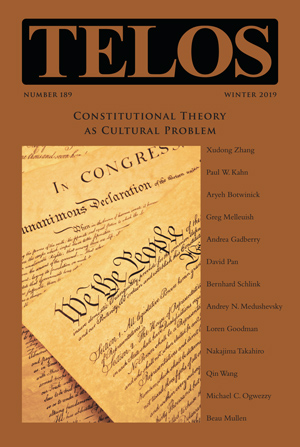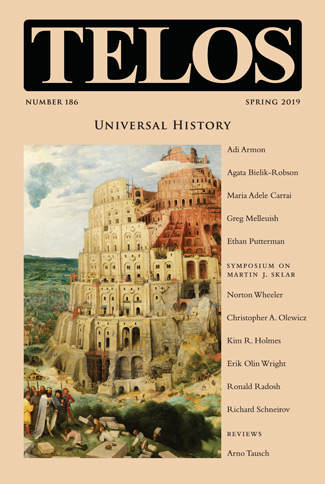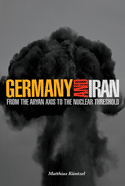By Russell A. Berman · Monday, October 26, 2020 From the beginning of Donald Trump’s campaign for the presidency and throughout his administration, the most consistent point of orientation in his politics has been the priority of the nation. It informed the slogan “Make America Great Again,” which initially shocked political sensibilities, since it implied the accusation that previous bipartisan political leadership had stood by during a decline or even facilitated a loss of greatness. The priority of the nation similarly underpinned the formula of “America First,” as the designation of a foreign policy that would give greater attention to national interest and therefore break with established patterns of multilateralism. Trump himself has embraced the term “nationalist,” and this marks his difference from both the free trade internationalism that used to define the neoliberal Republicans as well as from the multiculturalism that dominates the identity-political Democrats.
Between those two alternatives, globalism and fragmentation, Trump has opted for the nation. With that choice, he put his finger on the forgotten category—class—in an era of growing inequality. “Nation” serves as the organizing principle for programs purporting to achieve vertical integration, the “whole nation,” i.e., a promise—whether fulfilled or not—of an inclusive nationalism. Trump’s nationalism therefore is better described as a national populism. This aspiration for inclusion outweighs a simultaneous function of exclusionary nationalism, the differentiation from other nations, although that aspect clearly plays a role as well, especially in immigration policies.
Continue reading →
By Andrey N. Medushevsky · Thursday, January 2, 2020 Andrey N. Medushevsky’s “Law and Revolution: The Impact of Soviet Legitimacy on Post-Soviet Constitutional Transformation” appears in Telos 189 (Winter 2019), a special issue on constitutional theory. Read the full article at the Telos Online website, or purchase a print copy of the issue in our online store. Individual subscriptions to Telos are available in both print and online formats.
 The systematic investigation of the Russian revolutionary tradition in comparative, historical, and functional perspective provides the opportunity to understand its impact on the creation of the modern world and the contemporary social and political system. This article discusses the meaning, formation, and evolution of the Soviet project—the concept and practice of social and legal reorganization in Russia inspired by Marxist philosophical ideas and fulfilled during the period from the Bolshevik Revolution of 1917 until the collapse of the Soviet regime in 1991. Employing a cognitive theoretical approach in historical studies, the author examines the role of Communist myth in the formation of the Soviet state, the ideological and legal grounds of one-party dictatorship, the nature of nominal constitutionalism, and the role of institutional continuity in the formation of the current political system. He shows the place of the permanent grounds (ideology, nominal constitutionalism, and dictatorial impetus) as well as the place of changing parameters of the project (Soviet, federative, and class-oriented regulation) regarding their formal and informal influence on the political regime’s legitimacy and the cumulative impact on the system’s transformation and failure. In this context, the author discusses the evolution of the legitimating formula of the political regime from Tsarist times to the collapse of the Soviet regime, as represented in ideological programmatic, nominal Soviet constitutionalism (1918, 1924, 1936, and 1977 Soviet constitutions) and changing practices of the social mobilization. That makes possible the general evaluation of the revolutionary heritage and its influence on the current post-Soviet ideological priorities, political system, legal transformation, and prospects for its modernization. The systematic investigation of the Russian revolutionary tradition in comparative, historical, and functional perspective provides the opportunity to understand its impact on the creation of the modern world and the contemporary social and political system. This article discusses the meaning, formation, and evolution of the Soviet project—the concept and practice of social and legal reorganization in Russia inspired by Marxist philosophical ideas and fulfilled during the period from the Bolshevik Revolution of 1917 until the collapse of the Soviet regime in 1991. Employing a cognitive theoretical approach in historical studies, the author examines the role of Communist myth in the formation of the Soviet state, the ideological and legal grounds of one-party dictatorship, the nature of nominal constitutionalism, and the role of institutional continuity in the formation of the current political system. He shows the place of the permanent grounds (ideology, nominal constitutionalism, and dictatorial impetus) as well as the place of changing parameters of the project (Soviet, federative, and class-oriented regulation) regarding their formal and informal influence on the political regime’s legitimacy and the cumulative impact on the system’s transformation and failure. In this context, the author discusses the evolution of the legitimating formula of the political regime from Tsarist times to the collapse of the Soviet regime, as represented in ideological programmatic, nominal Soviet constitutionalism (1918, 1924, 1936, and 1977 Soviet constitutions) and changing practices of the social mobilization. That makes possible the general evaluation of the revolutionary heritage and its influence on the current post-Soviet ideological priorities, political system, legal transformation, and prospects for its modernization.
Continue reading →
By David Pan · Monday, March 18, 2019 Telos 186 (Spring 2019) is now available for purchase in our store. Individual subscriptions to Telos are also available in both print and online formats.
 This issue is devoted to the question of universal history and is based in part on a 2015 Telos-Paul Piccone Institute conference organized by Greg Melleuish. As this event suggested, universal history today imagines the convergence of humanity around a single trajectory of capitalist technological progress coupled with the defense of liberal rights. But as much as technology has increasingly linked the world into a single movement of history, we cannot say the same about liberal rights. Rather than pointing us toward the liberal light at the end of the historical tunnel, world politics seems to be casting us into the blazing arena of the “clash of civilizations” presaged by Samuel Huntington, with different regions of the world—Africa, America, Asia, Europe, the Muslim world—increasingly at odds, each region with a dominant civilization pursuing its own cultural and political hegemony. This divergence between a materialist unity of development and a cultural fragmentation frames the problem of universal history. This issue is devoted to the question of universal history and is based in part on a 2015 Telos-Paul Piccone Institute conference organized by Greg Melleuish. As this event suggested, universal history today imagines the convergence of humanity around a single trajectory of capitalist technological progress coupled with the defense of liberal rights. But as much as technology has increasingly linked the world into a single movement of history, we cannot say the same about liberal rights. Rather than pointing us toward the liberal light at the end of the historical tunnel, world politics seems to be casting us into the blazing arena of the “clash of civilizations” presaged by Samuel Huntington, with different regions of the world—Africa, America, Asia, Europe, the Muslim world—increasingly at odds, each region with a dominant civilization pursuing its own cultural and political hegemony. This divergence between a materialist unity of development and a cultural fragmentation frames the problem of universal history.
Continue reading →
By Jack Robert Edmunds-Coopey · Thursday, October 18, 2018 As an occasional feature on TELOSscope, we highlight a past Telos article whose critical insights continue to illuminate our thinking and challenge our assumptions. Today, Jack Robert Edmunds-Coopey looks at Herbert Marcuse’s “Contributions to a Phenomenology of Historical Materialism” from Telos 4 (Fall 1969).
Herbert Marcuse’s “Contributions to a Phenomenology of Historical Materialism” (1928) continues his efforts at fusing a contemporary form of Marxism with the work of his doctoral supervisor Martin Heidegger and his phenomenological project in Sein und Zeit (1927). The central tenet that Marcuse uses to construct a thread between Marxism and phenomenology is the analysis of the concrete and the correctness of knowledge as a truth related to this concreteness. The significance of Marxism as a theory of analysis is its self-reflexivity, the means by which it reflects on the process of historicity itself and, in addition to this, the processes of becoming that it undergoes as a result of its historical analysis. The difference here is that phenomenology claims to investigate the essences of things but does not concern itself with its own method or with a dialectical approach between the abstract and concrete, which inevitably occur as one attempts to capture a representation of an object.
Continue reading →
By Telos Press · Friday, August 31, 2018 In a new opinion piece in the Jerusalem Post, Sean Durns discusses Matthias Küntzel’s Germany and Iran: From the Aryan Axis to the Nuclear Threshold, published by Telos Press. Pick up your copy of Germany and Iran in our online store, and save 20% with the coupon code BOOKS20.
 As the German historian Matthias Küntzel detailed in his 2014 book, Germany and Iran: From the Aryan Axis to the Nuclear Threshold, close ties between the two countries go back to the pre-World War I era. As the German historian Matthias Küntzel detailed in his 2014 book, Germany and Iran: From the Aryan Axis to the Nuclear Threshold, close ties between the two countries go back to the pre-World War I era.
In the late 19th century, Persian hopes for industrial development hinged on German know-how and technological prowess. After the ascension of Kaiser Wilhelm II in 1888, “economic relations between the two countries began to expand swiftly” and “it became fashionable for young Persian intellectuals to be pro-German,” Küntzel notes.
Continue reading →
By Timothy W. Luke · Wednesday, July 11, 2018 On June 8, 2018, Telos celebrated its fiftieth anniversary at a special event held in New York City. Speakers included Telos editors Russell Berman, Tim Luke, David Pan, and Adrian Pabst, as well as Jacob Siegel, who delivered a talk on “Telos, Post-liberal Politics, and a Veteran’s Reading of Ernst Jünger.” Videos of the event are available at the Telos-Paul Piccone Institute website. Telos 183 (Summer 2018), our fiftieth anniversary issue, is available for purchase in our store. Presented below is a transcript of Tim Luke’s remarks at the anniversary event.
To address the history of Telos, I will open this brief account tonight about the journal by recalling my history with Telos since 1975. As a new cadre in “the St. Louis TELOS group,” I began by unloading boxes of Telos 26 (Winter 1975–76) from a panel truck early on a Saturday morning during the winter break outside of McMillan Hall, where Paul Piccone and the Telos office were embedded in the Sociology Department of Washington University, St. Louis. Working then as what we call an “intern” today, I soon was translating “into” the American English various versions of different draft manuscripts. Many articles at that time came through the mail as pages of disorderly text that another individual, like the author or an associate, with some English skills translated “out of” Czech, German, Hungarian, Italian, or Polish into a global semi-Anglophonic creole.
Continue reading →
|
|





